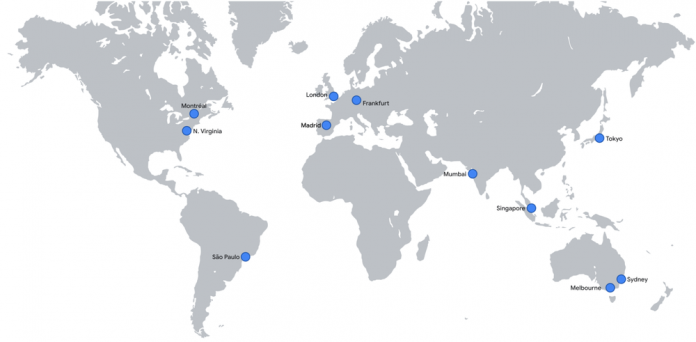In June, Google Cloud entered into an exciting new partnership with Oracle to provide private, secure, flexible, reliable, and low-latency connections to joint customers, with no data-transfer charges. With this partnership, Google Cloud and Oracle will build private, scalable, and secure peering capacity in multiple locations, removing port-setup lead times, and simplify the provisioning of end-to-end connectivity.
Enterprises increasingly turn to multicloud environments to leverage best-of-breed AI, analytics, and SaaS services. Additionally, mergers, acquisitions, and the need to interoperate with partners and customers often result in companies inheriting diverse cloud infrastructures. According to Gartner®, “A multicloud strategy has become crucial for enterprises and 81% use multiple cloud providers1.” Regardless of the driver, enterprises that used to build and manage networks on-premises and in colocation facilities — where they had full control over access, security, and capacity planning — are often faced with inefficient network architectures in today’s multicloud world. They must handle network access, routing, failover and capacity planning not only in a public cloud, but also across environments controlled by competing providers.
A new way with Cross-Cloud Network
To address those challenges, we announced Cross-Cloud Network last year, helping organizations accelerate and realize the benefits of their multicloud strategies, while minimizing the associated costs, complexities, and risks.
Cross-Cloud Network is a global platform that enables an open, secure, and optimized way to operate your enterprise network between different cloud environments. It leverages Google’s private backbone to provide seamless, highly performant, and secure communication for applications and workloads across multiple clouds with a lower total cost of ownership. Cross-Cloud Network is used for several common use cases:
Building distributed applications with integrated, secure connectivity and improved performance for applications that run across different cloud providers
Delivering global front-ends that are optimized for delivering web applications and content over the Google global backbone, helping to ensure fast and reliable access for users worldwide
Securing access for the hybrid workforce with ML-powered security solutions, enabling employees working from different locations and devices to securely access multicloud and SaaS applications
With Cross-Cloud Network, we have focused our efforts on building opinionated deployment models and key partnerships that help customers accelerate their infrastructure modernization journey, while maximizing the value of their investments, with Google products.
Our partnership with Oracle reinforces our Cross-Cloud Network strategy of fostering an open ecosystem, with maximum flexibility. Cross-Cloud Network leverages Cross-Cloud Interconnect, allowing customers to set up private, dedicated connections between their Google Cloud environment and other cloud service providers.
Google Cloud’s partnership with Oracle augments Cross-Cloud Interconnect’s dedicated offering with an additional option to leverage partner attachments to connect customers’ Virtual Private Clouds (VPCs) in Google Cloud to their Virtual Cloud Networks (VCNs) in Oracle Cloud Infrastructure (OCI) over existing, pre-provisioned private connections, starting with the regions shown below at launch.
Google Cloud – OCI interconnected regions at launch: Montréal, N. Virginia, São Paulo, London, Madrid, Frankfurt, Mumbai, Singapore, Tokyo, Melbourne, and Sydney.
Now, organizations can shift their focus from managing complex expensive networking infrastructures to leveraging differentiated services on Google Cloud and OCI, all while benefiting from:
Zero-cost data transfers over the partner Cross-Cloud Interconnects
Flexible, on-demand virtual connections that can be provisioned in minutes
End-to-end SLAs, with proactive monitoring and alerting
Support coordination to address potential issues on behalf of joint customers
This solution inherits the simplicity, cost efficiency, reliability, and high performance of Cross-Cloud Interconnect that has enabled it to become a foundational service for enterprise customers wanting to leverage Google Cloud’s differentiated services, while maintaining a footprint in other clouds.
Build robust cross-cloud applications
Customers can use this connectivity for building robust cross-cloud applications:
Google Cloud customers can seamlessly access Oracle databases in OCI over low-latency interconnects.
Similarly, OCI customers can benefit from using Google’s backbone and connect to Google-managed services; for example OCI customers can now easily access Google Compute Engine, Google Kubernetes Engine (GKE), BigQuery, Vertex, Spanner, and other leading services.
High-level cross-cloud architecture
To provision the interconnects, follow a few simple steps:
In Google Cloud, start by ordering Partner Interconnect attachments in a specific region.
Within a few minutes, Google Cloud will generate pairing keys, which you can use in the OCI console to create VCN attachments, specifying the desired connection speed (1, 2, 5, 10, 20, or 50Gbps).
Once completed, activate the Partner Interconnect attachment in Google Cloud and configure the routing details on both sides of the connection to enable seamless communication between their environments in Google Cloud and OCI.
To further leverage this robust connectivity, you can use Private Service Connect to securely and privately consume Google-managed services from OCI, as well as Network Connectivity Center to manage connectivity to VPC and hybrid destinations.
We are truly excited about this partnership with Oracle and the benefits it will bring to our joint customers, who can now make architectural decisions that serve their applications’ needs, without compromising on cost, simplicity, and reliability.
You can learn more about the setup process here.
1. Gartner, Cloud Survey: Multicloud Adoption Remains the Norm, Michael Warrilow, February 26, 2024.
GARTNER is a registered trademark and service mark of Gartner, Inc. and/or its affiliates in the U.S. and internationally and is used herein with permission. All rights reserved.
Cloud BlogRead More


